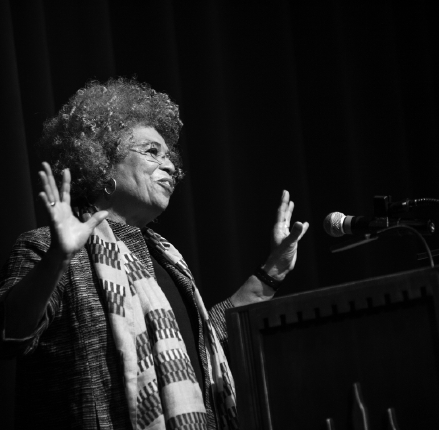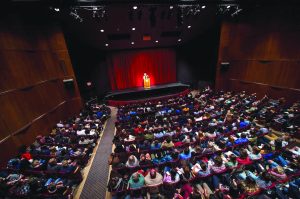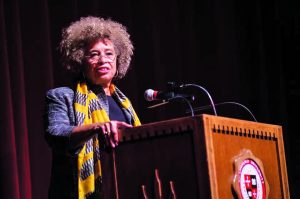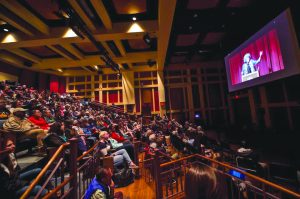Angela Davis glided onto the stage of the packed auditorium with an easy smile on her face. In our cultural collective memory, we know her as a hero of the Civil Rights Movement, a member of the FBI’s top ten Most Wanted List and an intellectual celebrity. Gulick Theatre was not just overflowing because of name recognition, but because she came to the North Country at a time when we all need a hero.
She talked about her first night in prison, how her tears lost their gravity when she heard the people outside chanting her name, and when I heard her say that, I wanted to be outside cheering with them. She went up against the government in the age of Nixon and won an impossible game. Now, we are at bat.
Davis talked about police brutality, the disproportionate number of people of color in prison, the Flint water crisis, the Ferguson police department, feminism, and oppression across the U.S and across the globe. Her lecture was broad, as it had to be, and each new topic ended in a truth bomb. She connected subjects that are normally kept separate.
I told my mom I went to an Angela Davis talk, and she asked me what she said. I told her it was very intersectional. She replied, “Intersectional is the new thing.” My mom’s not wrong. Intersectionality is essential, and we don’t have time to not take on every issue with the same fervor as the ones that affect us directly. It is impossible to fight one kind of oppression or form of injustice without standing against them all. Davis talked about intersectionality, starting with racism. “Suddenly, we recognize that racism is a lot more complicated.” It’s not about the cop that throws the tear gas, it’s about the relationships that exist,” she said. She went on to explain how the police department in Ferguson, Missouri was trained by the Israeli military, and that the brand of tear gas thrown at Palestinians came from the U.S. and was burning American eyes as well. Racism against black people, Latinx people, and Native Americans is intimately linked to Islamophobia. “So we’ve learned how to develop more complicated approaches, more intersectional approaches. I use that term very specifically in order to invoke feminism.”
To end her lecture, Davis talked about water. At the International Women’s conference she attended in Nairobi, Kenya in 1985, a Kenyan woman said, “But you know, water is a feminist issue.” Those gathered at the conference were puzzled. She was talking about how women are the ones who go out to collect water. Then Davis reflected on her time spent in Palestine in 2011, and how the Israeli army targeted water by shooting holes in the water tanks. When she visited Flint, Michigan; children were being poisoned by tap water. Again, she was reminded of the words this woman said when she learned about the struggle of the Standing Rock Sioux reservation against the Dakota Pipeline that would tear through sacred lands and degrade their water. This reflection brought her to the conclusion that, “Yes, absolutely, absolutely, water is a feminist issue.”
Ending on water was powerful. Water is a fundamental human right, yet people are systematically excluded from it. At the beginning of her lecture, Davis started by asking the audience, “How can freedom have been proclaimed in this country at a time when the majority of human beings, not to speak of other beings, were not even included in the idea of freedom?” Everything is connected. The way we treat the planet affects the lives of people, beginning with the most marginalized.






